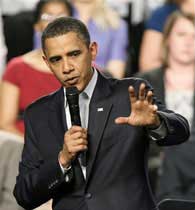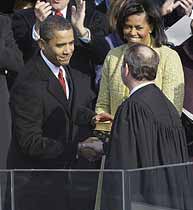This is IN THE NEWS in VOA Special English.
President Barack Obama has begun his second year in office. The 44th president, and first African-American president, was inaugurated last January 20th.
BARACK OBAMA: "Today I say to you that the challenges we face are real, they are serious and they are many. They will not be met easily or in a short span of time. But know this America, they will be met."

Those challenges included an economic downturn, wars in Afghanistan and Iraq and a promise to reform the health care system.
Congress quickly approved an economic recovery bill. Yet unemployment remains high at ten percent. The Obama administration now faces the earthquake relief effort in Haiti and the threat of terrorism at home. There was a failed attempt to bomb a plane on its way to Detroit, Michigan, on Christmas Day.
BARACK OBAMA: "As president, I have a solemn responsibility to protect our nation and our people. And when the system fails, it is my responsibility."
President Obama campaigned on a promise of "change we can believe in." His high public approval ratings have fallen in recent months. A poll by Quinnipiac University in Connecticut found Americans equally divided about his first year. Peter Brown works at the university.
PETER BROWN: "They like Obama personally. They think he is trustworthy and honest. They think he is a strong leader. They say they don't necessarily agree with him on the issues they are most concerned about. They wish he would spend more time on the economy. They don't like the health care bill."
The Senate and House of Representatives have each passed their own health care legislation. But there is no final bill. And the Democrats have a new problem they had not expected.
A newly elected senator is a Republican who opposes the legislation. Scott Brown won a seat in Massachusetts that had been held by Democrat Ted Kennedy for almost 50 years.
But more importantly, Senate Democrats lost their 60th vote. Senators can threaten a bill with unlimited debate unless 60 senators vote to prevent it.
President Obama had campaigned for the Democratic candidate in Tuesday's special Senate election in Massachusetts. Experts say one of the lessons is that even though the economy has improved, it demands more attention.
David Wasserman from the Cook Political Report in Washington was a guest on VOA's "Encounter" program.
DAVID WASSERMAN: "I don't think President Obama and the Democrats were expecting to have to spend so much time on health care because it is dragging on. And in the eyes of a lot of Americans, this is not really dealing with the economy. This isn't bringing back jobs."

During his first year, President Obama angered conservatives who saw him as unwilling to compromise on issues like health reform. Yet some liberals saw him as too willing to compromise. They were disappointed with decisions like sending more troops to Afghanistan and not closing the Guantanamo Bay prison.
Many political experts are mixed in their opinions. But Larry Sabato at the University of Virginia says not to judge too much from the first year.
LARRY SABATO: "If you look back in history you will find that many presidents who were enormously popular in that first year became failed presidents over time. Other presidents who were not terribly popular in their first year and had lots of controversies served two full terms and went out of office in a reasonably positive way."
Congressional elections will be held in November, and Republican gains are likely. Smaller Democratic majorities could force the president to reach out to the opposition and to conservatives in his own party.
And that's IN THE NEWS in VOA Special English. I'm Mario Ritter.
Obama's presidency a living example for African Americans
Mixed reviews in Europe, Middle East for Obama's first year
(來(lái)源:VOA 編輯:陳丹妮)
